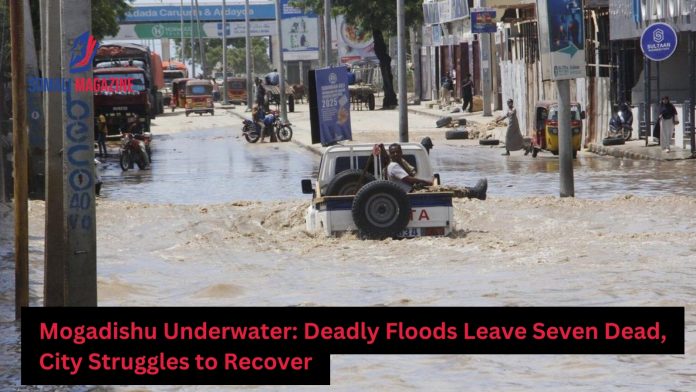Facebook Twitter (X) Instagram Somali Magazine - People's Magazine
At least seven people have died after relentless heavy rains triggered severe flooding in Somalia’s capital, Mogadishu, leaving waist-high waters in multiple neighborhoods and causing widespread destruction. The downpour, which lasted for approximately eight hours on Friday night, overwhelmed the city’s drainage system, cutting off major roads and forcing residents to seek refuge on rooftops.
Authorities fear the death toll could rise as rescue operations continue. Abdinasir Hirsi Idle, spokesperson for the regional administration, confirmed that nine houses collapsed across different districts, while at least six major roads suffered extensive damage. “The rains were heavy and lasted for several hours, causing significant destruction. The assessment is ongoing, and we expect the numbers to change,” Idle stated.
Somalia has long been vulnerable to extreme climate shocks, oscillating between prolonged droughts and devastating floods. The latest disaster underscores the country’s fragile infrastructure, with urban expansion and poor drainage systems exacerbating the impact of heavy rainfall. Residents in the worst-hit areas described scenes of chaos as floodwaters surged through homes and businesses, trapping people inside.
Mohamed Hassan, a resident of Mogadishu, recounted the harrowing experience of spending the night stranded on a rooftop. “We spent the night shivering from the cold, waiting for the waters to recede. Some elderly people are still trapped, and we don’t know when help will arrive,” he said.

The flooding also disrupted key infrastructure, halting public transport and temporarily suspending operations at Aden Abdulle International Airport. Officials later confirmed that flights had resumed, but damage assessments are still underway. The Somali Disaster Management Agency has yet to release an official death toll, though emergency teams are working to determine the full extent of the destruction.
The Ministry of Energy and Water issued a warning on Saturday, stating that over 115 mm of rainfall had been recorded within eight consecutive hours. Authorities cautioned that flash floods could affect other regions beyond Mogadishu, urging residents to take precautions.
The humanitarian impact of the floods is expected to be severe, with displaced families in urgent need of shelter, food, and medical assistance. Aid organizations have mobilized response teams, but logistical challenges remain due to blocked roads and submerged neighborhoods.
Somalia’s government has pledged to enhance disaster preparedness and improve drainage systems to mitigate future flooding risks. However, experts argue that long-term solutions require substantial investment in climate resilience and urban planning.
As Mogadishu grapples with the aftermath of the floods, the focus remains on rescue efforts and recovery. The disaster serves as a stark reminder of Somalia’s vulnerability to climate extremes and the urgent need for sustainable infrastructure solutions.

